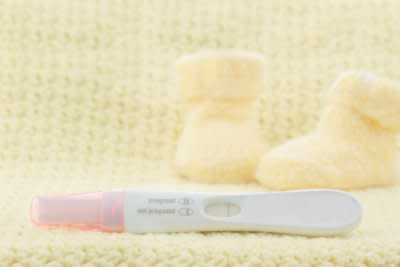Infertile and proud: the growing women's movement to de-stigmatize infertility

There was a time, not so long ago, wheninfertility was somethingwhispered under pitying, gossip-ful coffee breath.
"That's Rose's daughter, she can't have a baby" or "They keep trying, but something's wrong."
These days, many women are sick of the whispers. They're infertile and they're not ashamed.
The childbearing generation of the late 2000's are nothing like those that came before them. Many are opting out of parenting in favor of fertile careers, others are turning to the magical promise of medicine. We've seen it work for celebrities and innumerable reality stars. But we don't usually hear about the one in 20 couples who don't have the same success.
An estimated 5 million Americans are battling infertility and as a result feel stigmatized by society.
"Everybody looks at treating infertility as a problem to be solved," says Pamela Tsigdinos, author of Silent Sorority. She was embarking on her fourth IVF trial when she decided, at the age of 40, she couldn't handle another round of physically painfully treatments and emotionally brutal outcomes. "The entire system is optimized for success of mother and child, so when you reach the end of the line with treatment and it doesn't work for you, you feel like an outcast."
It wasn't until she was 43 that Pamela accepted children weren't in her future and she began writing a blog, and later a book about what she describes as "coming out of the closet" as an infertile woman.
"Everyone will tell you to keep trying because nobody wants to believe you just can't, but once you acknowledge the truth it takes the dread factor way," she says. "I had to accept my life wasn't going to be like my mother's or my best friends."
Pamela's 'silent sorority' of women who can't conceive are becoming more vocal in the past few years. A blogging community of women who share the details of their life as 'out' infertile women are working to de-stigmatize the very thing so many people are ashamed or afraid to talk about.
"Most folks look at you like you're someone who waited too long and there's a sense of blame like your childlessness is self-inflicted," adds Pamela. "People have a very primal response when you mention the word infertility."
"My vision is that infertility becomes an acceptable form of a medical condition rather than the false images that we deal with everyday," writes one blogger who goes by the moniker The Infertile Gourmet. "We did not "selfishly " choose careers over families and lack rights to be parents now. Get with the reality of the modern infertile women. I refuse to be shameful about my ovaries."
Community forums like single infertile female, and Redbook's video campaign "The Truth about Trying",aim to give a voice to women who've struggled with their own infertility and to show other sides to experience than just a one big happy family ending.
The latest edition of Our Bodies, Ourselves, out last month, offered another boon for women dealing with infertility. The updated feminist tome added new information and context about the emotional aspects of fertility treatments and pregnancy struggles. "Given 1 in 6 women will experience difficulty getting pregnant, we knew that this issue of important to many of the readers and all the material needed to be covered in a very sensitive, supportive and accurate manner," Our Bodies, Ourselves editor Evalina Sterling tells Shine.
Sterling says that infertility as a topic has become markedly more mainstream in recent years: it's fodder for one hour hospital dramas, it's the basis of reality shows and tabloid profiles. But what's missing from the conversation is the unsuccessful outcome that falls on many.
"People are afraid of being judged or feeling like a failure, especially when it seems like all their friends got pregnant so easily," says Sterling. "I think things have gotten better, largely through social media, websites, and blogs written by people experiencing infertility, but we still have a long way to go. Until everyone sees infertility as something that can affect anyone, anytime, for any reason, and not try to ascribe blame or make it seem like a luxury or choice, it will continue to appear as an us (fertility folks) against you (infertility folks) type of scenario."
For Pamela, now 48, infertility is no longer a bad word. "I would say my life has improved immeasurably when I gave myself permission to live a different kind of normal life," she says. "Not normal like other people's normal, but my normal."
Now she's hoping to pass that lesson on to other people who have children. "The first question in any social setting is: 'do you have kids?' People need to learnthat if you don't have kids it doesn't mean you don't want them, or that you missed the boat or that there's something wrong with you. It's just there are shades of gray to every situation."
Related:
What not to say to a friend who's infertile
Womb transplants: the next big fertility measure
How infertility affects women
The different ways men and women handle infertility
